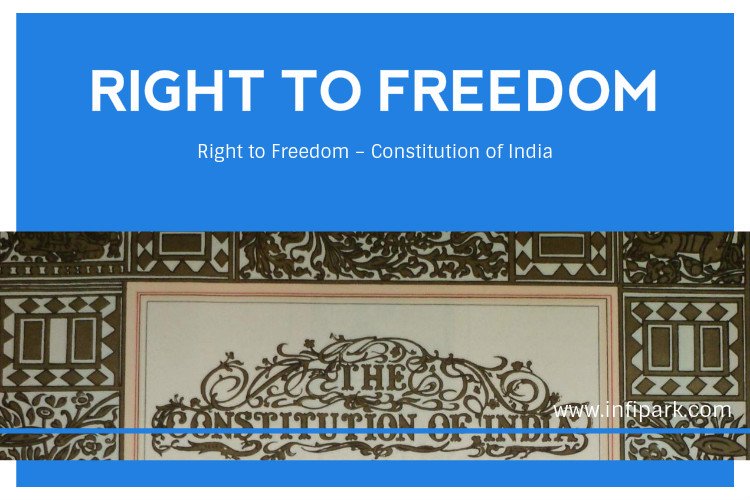Right to liberty and personal freedom is another important fundamental right given by the Constitution of India. This right helps the citizens of India to enjoy a number of rights such as the freedom of speech and expression, freedom to assemble peaceably and without arms, to form associations or unions, to move freely throughout the territory of India, to reside and settle in any part of the territory of India; and to practice any profession, or to carry on any occupation, trade or business. The Indian Constitution explains the Right to Freedom in detail under the articles 19, 20, 21 and 22. These rights were included by the framers of Indian constitution to safeguard individual rights of citizen of India, subject to certain limitations in order to maintain the law and order and integrity of the state.
Right to liberty and personal freedoms are explained as below:
Article 19: It guarantees the following six freedoms:
‘Freedom of speech and expression’ that allows an individual to take part in public activities. Though the words, “freedom of press” have not been mentioned in Article 19, freedom of expression also encompasses ‘freedom of press’. However, reasonable limitations can be imposed to maintain the public order and to protect the decorum and ethics of the State.
‘Freedom to assemble peacefully’ without arms, though again the State can enforce rational limitations to maintain public order and the autonomy and integrity of India.
‘Freedom to form associations or unions’ along with certain restrictions enforced by the State in the interest of public order, morality and the sovereignty and integrity of India.
‘Freedom to move freely throughout the territory of India’, subject to certain restrictions to maintain the interest of the general public. For instance, the state can restrict travelling or commuting during epidemics to prevent it from spreading.
‘Freedom to live and settle in any part of the territory of India’ which is also subject to certain limitations by the State to maintain the interest of the general public or to safeguard the rights of the native scheduled tribes and protect them from exploitation and oppression.
‘Freedom to practice any profession or to carry on any occupation, trade or business’ – here the state may impose justified limitations to protect general public. Thus, nobody according to Indian Constitution has the right to run a business which is hazardous or corrupt. Again, to practice any profession or carrying out any particular business, professional or technical qualifications may be prescribed.
Article 20: Protection in respect of conviction for offences
According to the article 20 of Indian Constitution, no one can be penalized more than what the law of the land lays down. Also, no legal action shall be taken or no punishment shall be imposed on any person for the same offence more than once. This is known as the principle of double jeopardy. And no person who is charged by any offence shall be forced to be a witness against himself. Article 20 of Indian constitution protects against self incrimination.
Article 21: Protection of life and personal liberty
Article 21 of Indian constitution states that no citizen can be denied his life and liberty, except by law. In simple words, a person can lose his freedom with respect of his life and personal liberty only if he has committed a crime. Nevertheless, the right to life does not comprise of the right to die, thus suicide or even an attempt to suicide is an offence. Article 21, also includes the right to travel abroad under ‘personal liberty’.
Article 21(A) was also included in 2002, by the 86th Amendment Act, which made the right to primary education part of the right to freedom, stating that the State would offer free and essential education to children from six to fourteen years of age. The Union cabinet cleared the Right to Education Bill in 2008, after making an amendment in the Indian Constitution.
Article 22: Protection against arrest and detention in certain cases
Article 22 of the Indian Constitution lays down the right of a person arrested under ordinary situation. Without being told the reasons for his/her arrest, no citizen of India can be arrested in normal circumstances. And if he/she gets arrested, the person has the right to defend himself by a lawyer of his choice. These rights are subject to certain restrictions in certain situations, for instance, the rights of a person arrested under ordinary circumstances are not enjoyed with respect to an enemy alien. Also, these rights cannot be enjoyed by persons detained under the Preventive Detention Act. Under preventive detention, the government has the right to detain or imprison a person for a maximum of three months, if the government anticipates a particular person to be a threat to the law and order or peace and integrity of the nation. After three months such a case is brought in front of an advisory board for review.
Thus, citizens of Indian are granted with the right to liberty and personal freedom subject to certain restrictions in order to maintain law and order in the country.







